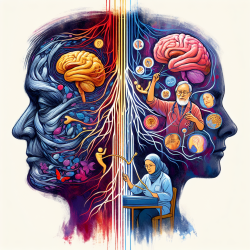Introduction
Stroke recovery is a multifaceted process that demands a comprehensive understanding of both physical and cognitive rehabilitation. A recent study titled In Search for the Meaning of Illness: Content of Narrative Discourse Is Related to Cognitive Deficits in Stroke Patients sheds light on the potential of narrative discourse as a diagnostic tool for speech-language pathologists. This research highlights how patients' narratives can provide invaluable insights into their cognitive deficits and recovery journey, emphasizing the importance of integrating narrative analysis into therapeutic practices.
The Power of Narrative Discourse
Narrative discourse refers to the structured way in which individuals recount their experiences, often revealing personal insights and attitudes towards their illness. The study by Egbert et al. (2021) suggests that analyzing the thematic content and story types in stroke patients' narratives can offer additional information about their cognitive functions. This approach can complement traditional neuropsychological assessments, providing a more holistic view of a patient's condition.
Key Findings
The research indicates that stroke survivors' narratives often include themes related to their cognitive and physical challenges, emotional changes, and coping strategies. These themes are categorized into three main story types:
- Restitution Story: Focuses on recovery and returning to a pre-illness state.
- Quest Story: Emphasizes acceptance and personal growth following the illness.
- Chaos Story: Reflects feelings of hopelessness and disorganization.
The study found that the use of chaos stories was particularly associated with cognitive deficits, especially in executive functions, in patients with right hemisphere damage. This suggests that the narrative style can be a marker of cognitive health, providing clinicians with a non-invasive tool to gauge cognitive impairments.
Implications for Practitioners
For speech-language pathologists, incorporating narrative analysis into therapy sessions can enhance the understanding of a patient's cognitive state and recovery process. By encouraging patients to share their stories, clinicians can identify specific cognitive challenges and tailor interventions accordingly. This personalized approach not only aids in cognitive rehabilitation but also supports emotional and psychological well-being.
Moreover, narrative discourse analysis can serve as an early warning system for cognitive decline, allowing for timely interventions. Practitioners should be attentive to the themes and story types in patients' narratives, as these can provide clues about underlying cognitive deficits and inform treatment plans.
Encouraging Further Research
While the study provides promising insights, it is essential to conduct further research with larger cohorts to validate these findings. Future studies should explore the relationship between narrative discourse and cognitive deficits across diverse populations and settings. By expanding the research base, we can refine narrative analysis techniques and enhance their clinical utility.
Conclusion
Incorporating narrative discourse analysis into stroke rehabilitation offers a unique opportunity to enrich therapeutic practices. By understanding the stories patients tell about their illness, speech-language pathologists can gain deeper insights into their cognitive and emotional states, ultimately leading to more effective and personalized interventions.
To read the original research paper, please follow this link: In Search for the Meaning of Illness: Content of Narrative Discourse Is Related to Cognitive Deficits in Stroke Patients.










